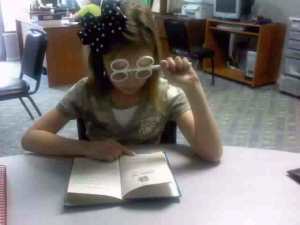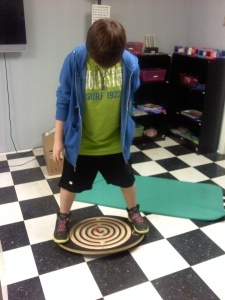Vision Problems Not Revealed by Eye Charts Can Interfere with Learning. Vision Therapy May Be the Answer.

I saw a lot of students and parents in my clinic last month who took my advice and added an eye exam to their back to school list. However, many children with corrected vision, as well as children with 20-20 vision who don’t need glasses, continue to struggle in the classroom. Often, the cause is vision-related. Conditions like amblyopia (lazy eye), strabismus (crossed eyes) and diplopia (double vision), as well as a host of less obvious problems like eye teaming issues, cannot be treated with corrective lenses but are still addressable. These conditions make reading and learning, fine motor skills, and high-velocity sports difficult and frustrating. A few weeks into a new school year is often when students and teachers begin noticing these problems. Vision therapy could be the answer.

Vision therapy is just that — therapy for the eyes. It has been compared to physical therapy for the eyes; however, we are not only strengthening the eyes but also teaching the eyes to work together as a team. The process is customized to each patient’s needs and consists of an ongoing schedule of exercises. Sessions usually take place once or twice a week in the clinic, and the patient is assigned tasks and exercises to do at home. If parents see to it that the therapy schedule is followed correctly, over time patients usually notice improved reading skills, improved hand-eye coordination, and reduced eye strain and headaches. Over the next few weeks, I will write a series of blog posts describing some of the tools and exercises used in vision therapy.
If your child has had regular eye exams and continues to struggle in class, there are a few things to look for to see if the problem is vision-related. Many students with vision problems get headaches while doing schoolwork, have trouble recognizing common words, lose their place often while reading, or see shifting or floating words on the page. They may blink their eyes frequently and tilt their head when trying to focus.
If you think your child’s problems in school may be related to vision, tell your optometrist the symptoms they are experiencing so you can schedule a more in-depth eye exam. Then you can discuss whether or not vision therapy is right for your child.
Dr. Jeff Pinkerton
I care for you.
Comments are closed.

[…] Eye Care, Services, Vision Therapy | Leave a comment Tweet My last blog post provided a basic definition and overview of Vision Therapy. As promised, in this and future posts I will introduce you to some of the tools used in our Vision […]